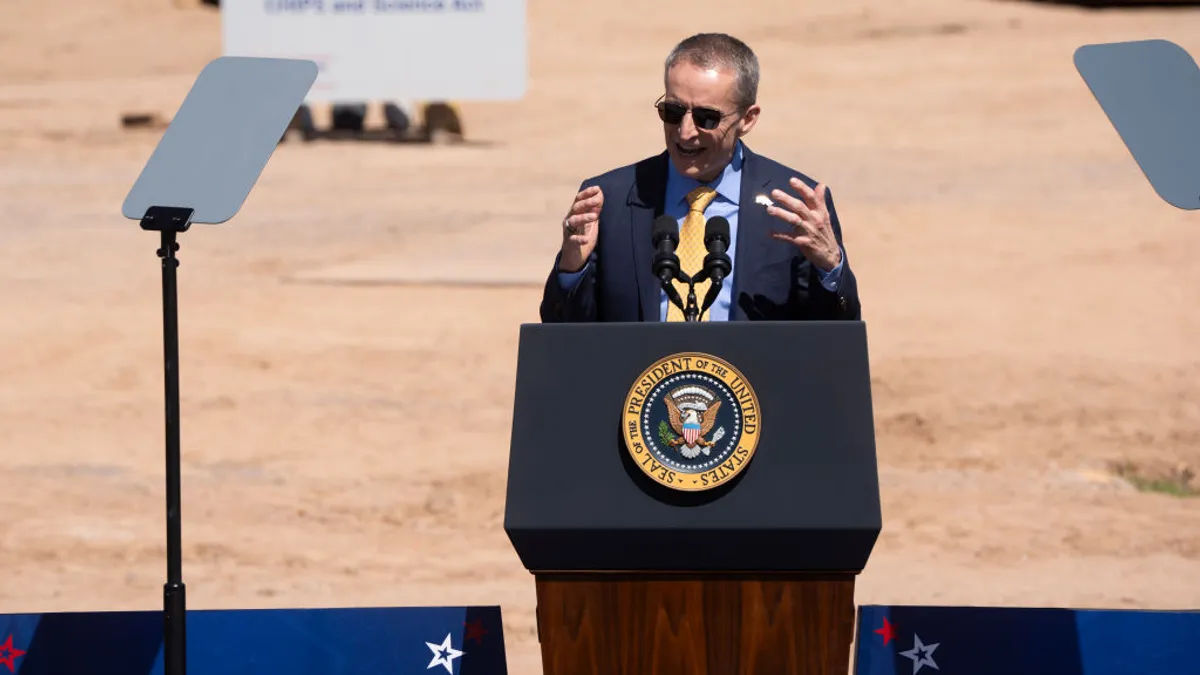Dive Brief:
- Intel CEO Pat Gelsinger retired Sunday after three-years running the chipmaker, the company said Monday.
- Intel EVP and CFO David Zinsner and CEO of Intel Products Michelle Johnston Holthaus took over as interim co-CEOs while the executive board searches for its next CEO. Frank Yeary, Intel's independent board chair, will become interim executive chair.
- "With Dave and MJ’s leadership, we will continue to act with urgency on our priorities: simplifying and strengthening our product portfolio and advancing our manufacturing and foundry capabilities while optimizing our operating expenses and capital," said Yeary. "We are working to create a leaner, simpler, more agile Intel.”
Dive Insight:
Gelsinger, who spent the first 30 years of his professional career at Intel, returned to the chipmaker in 2021 as its CEO after more than eight years as CEO of VMware. He laid out an ambitious five-year turnaround plan to restore Intel's competitiveness, ramp up innovation and, most notably, expand its foundry business.
Despite the efforts, high investments to boost capacity hurt Intel's financial performance. The company in January reported $54 billion in 2023 revenue, a 14% decrease from 2022. In its Q3 2024 earnings report in October, Intel reported revenues of $13.3 billion, down 6.3% year over year.
As revenues slid, capital expenditures spiked amid Intel's efforts to expand foundry capacity, going from $18.7 billion in 2021 to $25.8 billion in 2023.
"From the strategic point of view, I think the weakness in their strategy was the emphasis on the investment level to regain the lead in the foundry business," said Forrester Senior Analyst Alvin Nguyen. "That's hugely expensive."
Under Gelsinger's leadership, Intel failed to regain its position in the data center market amid the rise of competitors like AMD.
"Losing their lead in the data center business, in CPUs, and then not being able to capture any credible amount of the data center AI business on the product side is what's led to this," Nguyen said.
The company also missed its projections for market adoption of Gaudi, its line of AI accelerators.
"The overall uptake of Gaudi has been slower than we anticipated as adoption rates were impacted by the product transition from Gaudi 2 to Gaudi 3 and software ease-of-use," Gelsinger said in October, during an earnings call. "As a result, we will not achieve our target of $500 million in revenue for Gaudi in 2024."
Last week, Intel and the U.S. Commerce Department put the finishing touches on a $7.8 billion CHIPS and Science Act grant aimed at backing the company's chip manufacturing efforts.
As President-elect Donald Trump prepares to take office in January, one area to watch is how the incoming administration might address CHIPS funding and the semiconductor sector overall, Nguyen said.
"Any delay in funding to Intel is going to be problematic, because they made the commitments and they have to act," Nguyen said. "The government is not known for being on time very often. So if it takes too long, they are going to be left holding the bag."













